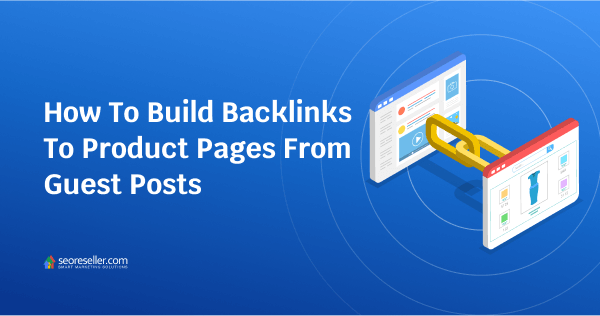Search Engine Optimization has a lot of moving components to it. Among the various aspects that govern your ranking in the SERPs, link building is among the toughest to execute.
The main reason for this is because most of the organic backlinks you acquire are to your homepage or blog posts. Very few authority websites are comfortable linking to your product or sales pages, even within your guest posts.
As an SEO consultant, this is bad news since your primary objective is to rank your product pages on the SERPs for the relevant keywords.
You may, of course, build internal backlinks from your high authority blog posts to these internal pages. But that may not be enough if you want to rank for highly competitive keywords.
In this article, we are going to discuss strategies that businesses can use to build backlinks to their product pages from guest posts.
Picking topics strategically
Most established websites that accept guest post submissions forbid authors from linking to “unnatural” destinations which include a product or sales page. Links to homepages are allowed albeit within the author box.
So one way to gain a backlink to your product page is by picking a topic where a link to your product makes strategic sense.
For example, if you are writing an article for a marketing blog and want to link to your legal client’s service page, you could pick a topic like “15 Local Business Sales Pages Examples”. Here, you could review your client’s service page along with several other local businesses.
On a topic like this, it makes complete sense to link to the service page.
Roundup Swaps
If you have spent any significant time in SEO, you may already know about the “expert roundup” strategy to build backlinks.
Here, marketers seek websites that publish “expert roundup” stories on their blog and offer a quote for their upcoming roundups. This way, when the attribution is made, the marketer can get a backlink to their website.
Now, this strategy is similar except that you publish expert roundups on your blog. But before you go seeking experts, find specific spots on the other website where a link to your product page can work.
For instance, if you sell real estate software, you could find articles on topics like real estate automation and reach out to marketers from these websites for quotes.
In return for their quote, you could seek a link from the real estate automation article to your page.
To avoid this from becoming a link exchange, you could partner with agency marketers so that you could link to their agency website in return for a link from their client pages.
It’s a win-win for both sides.
Sharing launch experiences
The problem with so many guest posts is that they add no unique perspective. It’s always yet another listicle or “how-to” post.
Guest bloggers who share unique experiences or perspectives are hence highly sought after. And this is a gap that you could exploit.
For a product management blog, you could share experiences related to launching this specific product. On a marketing blog, you could share your experience in launching your product on ProductHunt.
The idea here is to write on topics that share experiences related to the product where a link to the product pages makes contextual sense.
Another way to drive success with this strategy is to find a trending topic and share experiences related to this. For example, the current pandemic has forced many organizations to work remotely. Sharing your organization’s experience on this topic is both relevant and is highly sought after.
While linking to your product page here won’t be easy, a good way to link to it would be by announcing your successful launches done in the new setup.
Tutorial posts
This is one of the most effective strategies to build product page links. This is not just because comprehensive tutorials get high search visibility, but also because these are high-intent keywords.
This is because users who search for tutorials on specific topics are highly motivated to execute the task.
For example, an animation agency might publish articles on specific topics in the industry like a frame-by-frame animation.
Or, a social media marketing agency may publish a tutorial on creating visuals or graphics for their posts. These articles might include links to the product page and how it solves the issue.
In addition to finding users with high intent, the reason this strategy is so effective from an SEO perspective is that tutorial posts get syndicated by other websites and so a one-time effort could garner several backlinks back to your product page.
Definitive Guides
Although definitive guides (or, more commonly “the ultimate guides”) on various topics is an overdone strategy as far as guest posting is concerned, it is an effective way to build backlinks to your product pages.
Here’s how – blog publications like accepting contents around this topic since they tend to extraordinarily long and comprehensive – something that helps with their site’s SEO.
From the writer’s perspective, a definitive guide gives you the license to discuss all aspects of the topic, including the various competitors in the space, the tools one could use, and how they can be used.
Writing on these topics is impossible without actually linking to the specific product or sales page and is hence an ideal way to earn a backlink.
Also, like tutorial posts, definitive guides tend to get syndicated and shared a lot and this helps with more backlinks to your product pages.
In conclusion, it is fair to say that building links to your product pages won’t be easy. However, with a bit of creativity, it is possible to turn routine guest posts into great opportunities to link to your product pages.


